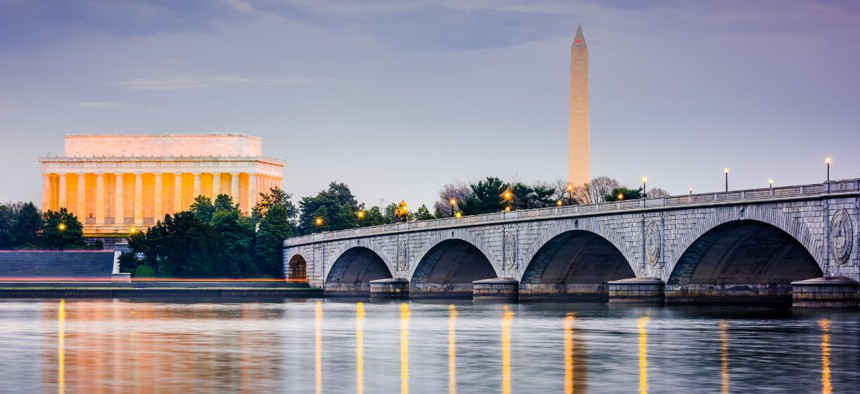Park Service Completes Plan to Repair Washington’s Memorial Bridge Under the Wire
Deadline to apply for Transportation grants with D.C. was Thursday.
The National Park Service, which for months has expressed worries about the deterioration of Washington’s Memorial Bridge, squeaked by under a deadline Thursday to deliver an application for a Transportation Department grant jointly with the District of Columbia.
“On April 14, the National Park Service and the District of Columbia submitted a strong application for the Department of Transportation FASTLANE Grant 2016 program to help fund the Arlington Memorial Bridge rehabilitation project,” the agency said in a Friday statement. “A joint applicant is essential to secure grant funding to repair this iconic bridge and critical transportation link between Virginia and D.C. used by 68,000 vehicles daily.”
The Park Service also announced it had just opened the public comment period for the final environmental assessment of the project.
The bridge, opened in 1932, is supervised by the Park Service because it links Arlington House to the Lincoln Memorial. Since 2010, the Park Service has spent nearly $10 million on temporary repairs to the bridge, which carries cars, bicyclists and pedestrians.
In the run-up to the deadline, Park Service Director Jonathan Jarvis received an urgent letter from area Virginia Democratic Sens. Mark Warner and Tim Kaine; Virginia Democratic Reps. Don Beyer and Gerry Connolly; and Del. Eleanor Holmes Norton, D-D.C., stressing the importance of working with Washington D.C. Mayor Muriel Bowser and others to submit the application.
According to the Metropolitan Washington Council of Governments, closing the Memorial Bridge would cost local governments a projected $168,000 per day ($75 million per year) by 2021 in transportation outlays alone, the lawmakers noted. “Transit studies suggest that traffic from the bridge would spill over onto other area bridges, particularly the 14th Street Bridge and Roosevelt Bridge. The impact on an already-strained transportation system could likely produce new, extreme levels of gridlock in the nation’s capital and its Northern Virginia suburbs.”
The FASTLANE grants program was established as part of the bipartisan transportation bill passed by Congress in 2015.








